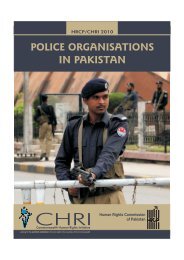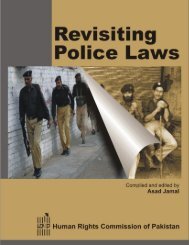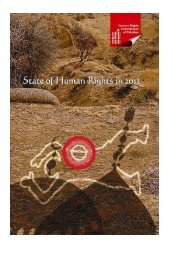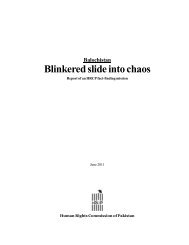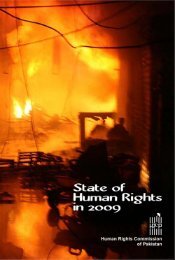Judical Action to end Bonded Labour - Human Rights Commission ...
Judical Action to end Bonded Labour - Human Rights Commission ...
Judical Action to end Bonded Labour - Human Rights Commission ...
You also want an ePaper? Increase the reach of your titles
YUMPU automatically turns print PDFs into web optimized ePapers that Google loves.
provided he on application <strong>to</strong> be made <strong>to</strong> the concerned District Judge/Civil Judge 1 st<br />
Class, gets a certificate for the purpose.<br />
(d) Payment of Wages. Payment of wages shall have <strong>to</strong> be made <strong>to</strong> the labourers on<br />
daily/weekly/fortnightly/monthly basis as agreed upon between the labourer and<br />
Bhatta owner, regularly. No deductions are <strong>to</strong> be made from their wages; for the<br />
damage/losses <strong>to</strong> bricks caused on account of rain and it shall be borne by the<br />
Bhatta owners.<br />
(e) Jamadar/Jamadarni System. The existing Jamadar/Jamadarni system is <strong>to</strong> cease<br />
forthwith. All the labourers shall have direct dealing with their respective owners. No<br />
payments on behalf of the labourers shall be made <strong>to</strong> them nor<br />
recoverable/adjustable.<br />
(f) The owners shall not directly or indirectly ask or pressurize any labourer for<br />
employing the womenfolk or children. However, if the latter do so at their own risk<br />
and responsibility, no complaint shall then be made against the Bhatta owners in this<br />
behalf. The head of the household who employs any of their womenfolk against her<br />
wishes and/or children might in proper cases be proceeded againstî.<br />
Within a short time this judgment and the discussion on bonded labour during the<br />
hearings provided a basis for the drafting of the <strong>Bonded</strong> <strong>Labour</strong> System (Abolition) Act of<br />
1992.<br />
SHC rules against bonded labour<br />
IV<br />
In the year 2000 the Sindh High Court, Circuit Bench, Hyderabad heard a number of<br />
petitions that sought the help of the court under Section 491 of CrPC <strong>to</strong> be freed of bondage<br />
<strong>to</strong> their landlords. At the same time several petitions were moved by landlords who<br />
cont<strong>end</strong>ed that relations between haris and their landlord- employers were regulated under<br />
the Sindh Tenancy Act of 1950 and that the <strong>Bonded</strong> <strong>Labour</strong> System (Abolition) Act was not<br />
applicable <strong>to</strong> the bonded haris. HRCP applied for being made a party <strong>to</strong> the case and<br />
although this request was accepted its counsel was not heard. The court deliberated at<br />
length on the application of Section 491 Cr.PC in habeas corpus petitions against detention<br />
of haris by their landlords and held: i) in cases of allegations of illegal/improper detention by<br />
private parties the courts should strictly scrutinise facts before issuing notice <strong>to</strong> anyone<br />
accused of illegally detaining anyone; ii) the Sindh Tenancy Act needed <strong>to</strong> be brought<br />
up<strong>to</strong>date; iii) that all disputes over loans secured by haris from landlords should be regulated<br />
strictly under the Tenancy Act; iv) the Mukhtiarkars should be obliged <strong>to</strong> maintain up<strong>to</strong>date<br />
records of tenants and tenancies; v) disputes between tenants and landlords should be<br />
decided by judicial forums and not by Mukhtiarkars; vi) since alternative remedies were<br />
available in matters of detention under the PPC, CrPC and the Tenancy Act, a direct resort<br />
<strong>to</strong> courts under Section 491 CrPC was generally <strong>to</strong> be avoided. The workersí petitions were<br />
dismissed for being vexatious.<br />
This judgment of the Hyderabad Bench of the Sindh High Court caused a huge<br />
setback <strong>to</strong> the struggle of the bonded haris <strong>to</strong> win freedom and reclaim their basic rights. For<br />
years they had been able <strong>to</strong> secure relief through courts under the habeas corpus law. This<br />
process almost ceased in Sindh. The Hyderabad Bench of the Sindh High Court s<strong>to</strong>pped<br />
entertaining any petition by a bonded labourer against his illegal detention. The landlords<br />
who had never concealed their resolve <strong>to</strong> wreck the <strong>Bonded</strong> <strong>Labour</strong> System (Abolition) Act<br />
were obviously emboldened <strong>to</strong> continue the exploitation of the poor haris.<br />
Soon after the Sindh High Court judgment was announced in 2002 the <strong>Human</strong> <strong>Rights</strong><br />
<strong>Commission</strong> of Pakistan moved the Supreme Court for leave <strong>to</strong> appeal against it. The main<br />
--- ix ---



